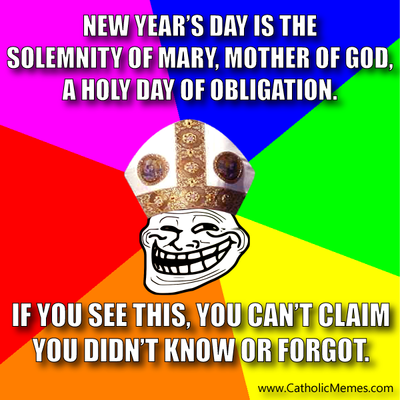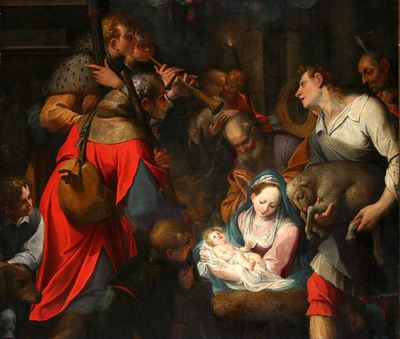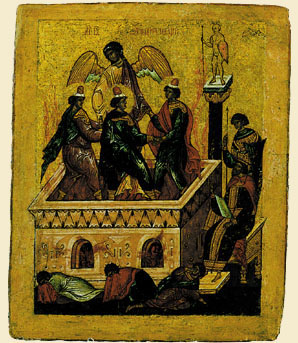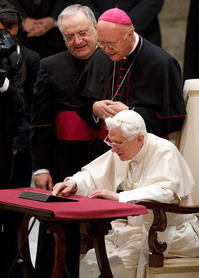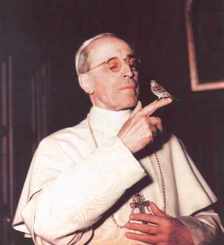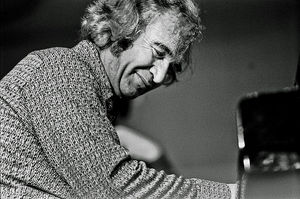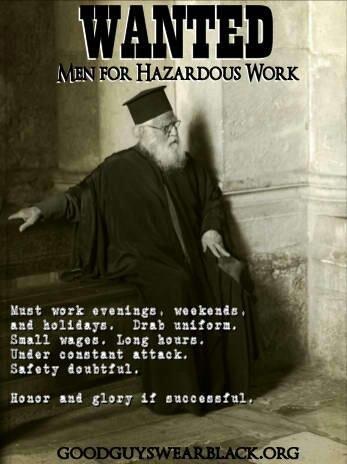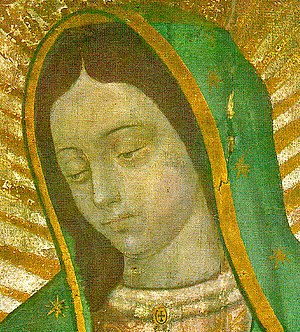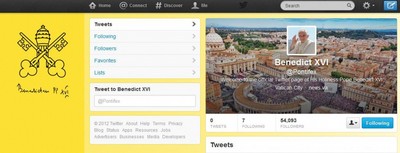December 2012 Archives
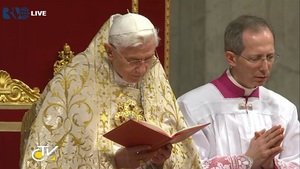
The Pope's homily for Vespers at the Vatican basilica follows below. He sets out a very clear direction for Christian living and pastoral activity. Are we going to listen? The Pope preached:
I thank all of you who have chosen to participate in this liturgy of the last hour of the year of the Lord 2012. This "hour" bears a particular intensity and becomes, in a sense, a synthesis of all the hours of the year that is about to come to an end. I cordially greet the Cardinals, Bishops, Priests, consecrated persons and lay faithful, and especially the many people from the ecclesial community of Rome. In a special way I greet the Authorities present, beginning with the Mayor of the City, and thank them for choosing to share with us this moment of prayer and thanksgiving to God.
Sing the Te Deum in thanksgiving for the past year and the Veni Creator for new year, and gain a plenary indulgence.
In the Enchiridion Indulgentiarum, 4th edition, 26:
§ 1. A plenary indulgence is granted to the Christian faithful who, in a church or in an oratory, are present [take part] in a recitation or solemn chant of: ...
1° the hymn Veni Creator ... on the first day of the year, imploring divine assistance for the whole of the coming year...
2° the Te Deum hymn, on the last day of the year, in thanksgiving to God for the favors received in the course of the entire year.
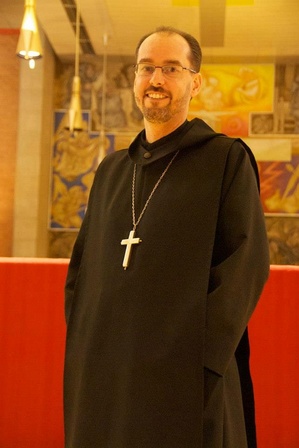 The monastic chapter of Saint Benedict's Abbey (Atchison, KS) elected Father James Robert Albers, 41 as the 9th abbot earlier today. Until now, he's served the monastic community as the Prior and vocation director.
The monastic chapter of Saint Benedict's Abbey (Atchison, KS) elected Father James Robert Albers, 41 as the 9th abbot earlier today. Until now, he's served the monastic community as the Prior and vocation director.The Most Reverend Peter A. Rosazza published this editorial on his Facebook page:
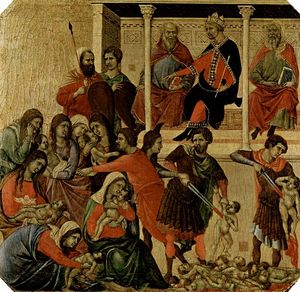
On December 28th our church commemorates the massacre of the Holy Innocents by King Herod shortly after the birth of Jesus. The Magi disturbed Herod when they asked him where they could find the new-born King since they had been led by his star to Jerusalem. Herod, jealous of his power, sent soldiers to kill all baby boys two years of age and younger in Bethlehem and its surroundings. Some scholars estimate the number at approximately twenty-eight.
Just two weeks earlier, on December 14th, another massacre of innocents occurred. As we know, eight boys and twelve girls, between the ages of six and seven, along with six women, were executed by twenty-year old Adam Lanza who had first killed his own mother. The principal of the school another woman ran toward him and were killed in the process.
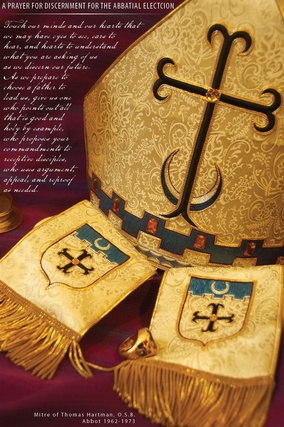 Later today the monks of Saint Benedict's Abbey
(Atchison, KS) enter into a special chapter (the group of solemnly processed)
to begin the process of electing a new Abbot.
Later today the monks of Saint Benedict's Abbey
(Atchison, KS) enter into a special chapter (the group of solemnly processed)
to begin the process of electing a new Abbot.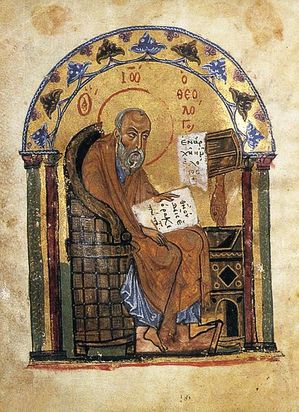 Today we honor the Apostle who likely knew the Lord's
mind and heart the best. Typically, Holy Church uses Scripture to bring us into
the sacred Liturgy but today the entrance antiphon is taken from the other leg
of the Magisterium, that of tradition to orient our prayer and belief. We are
told,
Today we honor the Apostle who likely knew the Lord's
mind and heart the best. Typically, Holy Church uses Scripture to bring us into
the sacred Liturgy but today the entrance antiphon is taken from the other leg
of the Magisterium, that of tradition to orient our prayer and belief. We are
told,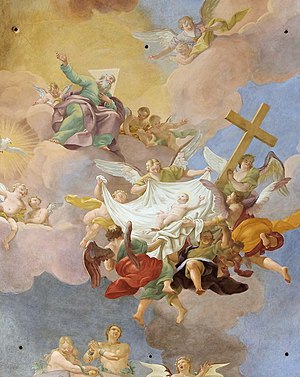
Glory of the New Born Christ Child in presence of God Father and the Holy Spirit (Annakirche, Vienna) Adam and Eve are represented bellow Jesus Christ Ceiling painted by Daniel Gran (1694-1757).
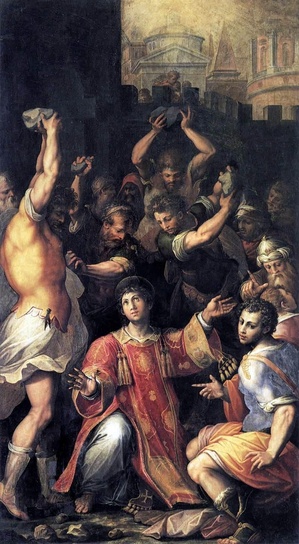 The gates of heaven were opened for blessed Stephen, who was found to be first among the number of the Martyrs and therefore is crowned triumphant in heaven. (Entrance Antiphon)
The gates of heaven were opened for blessed Stephen, who was found to be first among the number of the Martyrs and therefore is crowned triumphant in heaven. (Entrance Antiphon)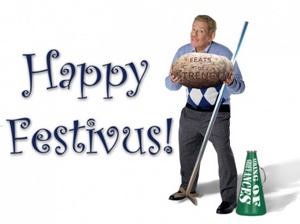 TODAY IS THE SOLEMNITY OF FESTIVUS! It is a Holy Day
of Obligation. Be sure to go to Holy Mass!!!
TODAY IS THE SOLEMNITY OF FESTIVUS! It is a Holy Day
of Obligation. Be sure to go to Holy Mass!!! O Lord, you have given us the great feast of Festivus to remind us that despite sending your only begotten and eternal son to redeem mankind, your people still prove to be a HUGE disappointment to just about everyone, including yourself I'm sure. We tell you this through our Lord Jesus Christ your son, who lives and reigns with you (because after 33 years down here, we ran him out of town) and the Holy Spirit, one God, forever and ever, Amen.
Having received, O Lord, from your abundant kindness this annual memorial of Festivus, we humbly beseech you, that, mindful of the saving mission of your Only-Begotten Son for the redemption of mankind, even as we prove a disappointment to ourselves beyond due proportion, so also we do to you as well. Through the same our Lord Jesus Christ, your Son, who etc.
(Mary prays:) "The Lord has exalted me by a gift so great, so unheard of, that language is useless to describe it; and the depths of love in my heart can scarcely grasp it. As I contemplate his greatness, which knows no limits, I joyfully surrender my whole life, my senses, my judgment, for my spirit rejoices in the eternal Godhead of that Jesus, that Savior, whom I have conceived in this world of time."
The Venerable Bede
Locking school doors will not keep Satan out if our hearts are open to him. Nor will banning weapons ban murder if God is banned from the conscience. Cain slew Abel without a gun. An illogical world can be saved from self-destruction only by loving the Logos who was in the Beginning, who was with God and was God.
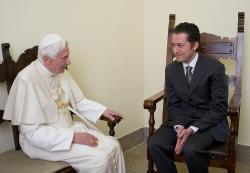 Forgiveness is only possible with God's grace. Pope John Paul II taught us this fact several times with the events of his own life and in Church life. Pope Benedict's papacy has notable grievances that require pardon. Today is a good example with the Pope forgiving the actions of his former butler Paolo Gabriele who leaked to the world the Pope's private letters and arrested on 23 May 2012.
Forgiveness is only possible with God's grace. Pope John Paul II taught us this fact several times with the events of his own life and in Church life. Pope Benedict's papacy has notable grievances that require pardon. Today is a good example with the Pope forgiving the actions of his former butler Paolo Gabriele who leaked to the world the Pope's private letters and arrested on 23 May 2012.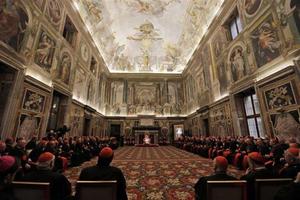
Pope Benedict gave his annual address, a "State of the Church," if you will, to the curial officials of the Holy See today.
You might say the content talk is crucially relevant for the work of the Church and the proclamation of the Gospel as he reviews key events and focuses on some themes. Among many things which need our attention and reflection, the Pope spoke about nature of man, family life, and inter-religious dialogue. Regarding man in which he gave insight into, he speaks of how evil and destructive vague and ideological the "gender conscious crowd" is to the nature of the person and removes God from conversation. Read the full text here.
The Pope notes the crisis of the family and its effect on society, caused by the unwillingness to make a commitment and by unwillingness to suffer. But he goes beyond the symptoms to diagnose the cause of the crisis. This talk is not an attack, it is an appeal to truth.
Each of Pope Benedict's addresses to the Roman Curia are important, certainly the 2005 address stands out, but today's will be memorable.
Here's a section:
First of all there is the question of the human capacity to make a commitment or to avoid commitment. Can one bind oneself for a lifetime? Does this correspond to man's nature? Does it not contradict his freedom and the scope of his self-realization? Does man become himself by living for himself alone and only entering into relationships with others when he can break them off again at any time? Is lifelong commitment antithetical to freedom? Is commitment also worth suffering for? Man's refusal to make any commitment - which is becoming increasingly widespread as a result of a false understanding of freedom and self-realization as well as the desire to escape suffering - means that man remains closed in on himself and keeps his 'I' ultimately for himself, without really rising above it. Yet only in self-giving does man find himself, and only by opening himself to the other, to others, to children, to the family, only by letting himself be changed through suffering, does he discover the breadth of his humanity. When such commitment is repudiated, the key figures of human existence likewise vanish: father, mother, child - essential elements of the experience of being human are lost".
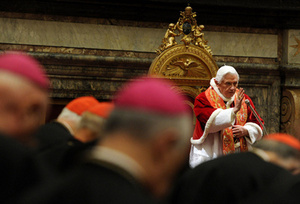 It's custom for the Holy Father to speak to the members of his Curia in way that reviews the past year, assessing the "situation" faced in the Apostolic ministry, and to give some idea of what will be worked on in the coming year. The address is ALWAYS worth the time to read, to study, and to reflect on in a serious manner. The Pope is a masterful thinker and writer; he really sets the bar pretty high but with clarity. One is clear to me is that the Pope is calling the laity to a new engagement in faith formation, worship of God, and cultural and political activities (not activism, there's a difference). You might say that the goal of the Pope in his address is to help us to rediscover the gift and beauty of Catholic faith. As he notes, God comes to us in the circumstances of life. Some people will latch on the sensational parts of the talk, especially with some of the more heated topics discussed in society today but the raising of issues and talking about them intelligently isn't a sign of trouble or weakness in the communion of the Church, but a way to seriously look at what is before us and to rely on God for help. We do, as you will agree, have a nostalgia for the Infinite which shows that we are limited human beings in need for a deeper conversion to the Good News. What the Pope reminds us here is that our Salvation doesn't come from within us but is given by Someone outside, that is, by the Most Holy Trinity.
It's custom for the Holy Father to speak to the members of his Curia in way that reviews the past year, assessing the "situation" faced in the Apostolic ministry, and to give some idea of what will be worked on in the coming year. The address is ALWAYS worth the time to read, to study, and to reflect on in a serious manner. The Pope is a masterful thinker and writer; he really sets the bar pretty high but with clarity. One is clear to me is that the Pope is calling the laity to a new engagement in faith formation, worship of God, and cultural and political activities (not activism, there's a difference). You might say that the goal of the Pope in his address is to help us to rediscover the gift and beauty of Catholic faith. As he notes, God comes to us in the circumstances of life. Some people will latch on the sensational parts of the talk, especially with some of the more heated topics discussed in society today but the raising of issues and talking about them intelligently isn't a sign of trouble or weakness in the communion of the Church, but a way to seriously look at what is before us and to rely on God for help. We do, as you will agree, have a nostalgia for the Infinite which shows that we are limited human beings in need for a deeper conversion to the Good News. What the Pope reminds us here is that our Salvation doesn't come from within us but is given by Someone outside, that is, by the Most Holy Trinity.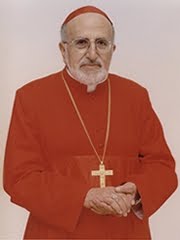 The 85 year old Chaldean Patriarch and Cardinal Emmanuel III Delly resigned today.
The 85 year old Chaldean Patriarch and Cardinal Emmanuel III Delly resigned today.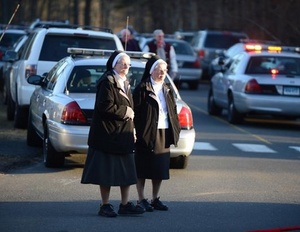 In the days following the Newtown tragedy many people are applying the concept of hero to those who lived and died with dignity offering themselves for the good of others. The adults at the Sandy Hook School can certainly be labeled as a heros. We can also bestow the title of hero on those who responded: police and fire personnel, healthcare professionals and social workers, and members of the clergy and consecrated religious.
In the days following the Newtown tragedy many people are applying the concept of hero to those who lived and died with dignity offering themselves for the good of others. The adults at the Sandy Hook School can certainly be labeled as a heros. We can also bestow the title of hero on those who responded: police and fire personnel, healthcare professionals and social workers, and members of the clergy and consecrated religious. 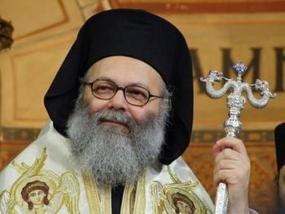 The Greek Orthodox Church of Antioch elected a new patriarch, His Eminence, Metropolitan Archbishop of Europe, John Yazigi, 57. He will be known as John X.
The Greek Orthodox Church of Antioch elected a new patriarch, His Eminence, Metropolitan Archbishop of Europe, John Yazigi, 57. He will be known as John X.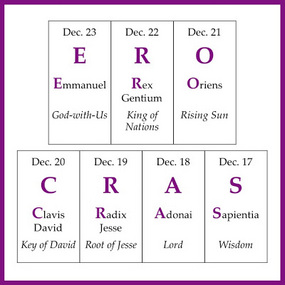 The tradition of the "O Antiphons" is now upon us. We will hear them beginning tonight at Vespers.
The tradition of the "O Antiphons" is now upon us. We will hear them beginning tonight at Vespers.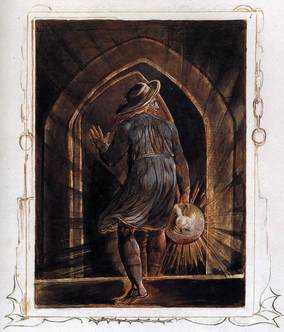 Our worship of God began today with the the Church quoting Saint Paul who wrote, "Rejoice in the Lord always; again I say rejoice. Indeed, the Lord is near" (Phil. 4:4-5).
Our worship of God began today with the the Church quoting Saint Paul who wrote, "Rejoice in the Lord always; again I say rejoice. Indeed, the Lord is near" (Phil. 4:4-5).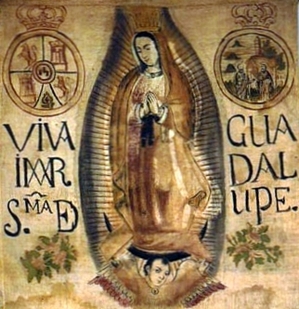 O God, Father of mercies, who placed your people under the singular protection of your Son's most holy Mother, grant that all who invoke the Blessed Virgin of Guadalupe may seek with ever more lively faith the progress of peoples in the ways of justice and of peace.
O God, Father of mercies, who placed your people under the singular protection of your Son's most holy Mother, grant that all who invoke the Blessed Virgin of Guadalupe may seek with ever more lively faith the progress of peoples in the ways of justice and of peace.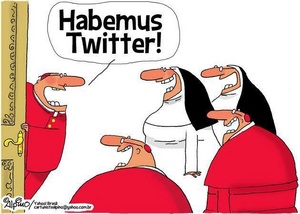 We now have a Pope that tweets. It's big news. Now there seems to be close to a million people following Pope Benedict's Twitter account @pontifex in a variety of languages.
We now have a Pope that tweets. It's big news. Now there seems to be close to a million people following Pope Benedict's Twitter account @pontifex in a variety of languages.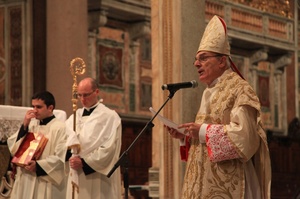 On Friday, Monsignor Massimo Camisasca, FSCB, 66, was ordained a bishop at Basilica of Saint John the Lateran (the cathedral of the Bishop of Rome) by Cardinal Carlo Caffarra, Archbishop Adriano Bernardini and Bishop Adriano Caprioli.
On Friday, Monsignor Massimo Camisasca, FSCB, 66, was ordained a bishop at Basilica of Saint John the Lateran (the cathedral of the Bishop of Rome) by Cardinal Carlo Caffarra, Archbishop Adriano Bernardini and Bishop Adriano Caprioli. This is the fundamental reason for my episcopate: to announce Christ, the Son of God made man, who underwent the Passion and the Cross for love of us, is risen and so is living, and acts in the history of mankind with the attractive force of his divine humanity through his Body in history, which is the Christian people, his Church.
Communion and Liberation, therefore, has chosen and chooses to indicate not a road, but the road toward a solution to this existential drama. The road, as you have affirmed so many times, is Christ. He is the Way, the Truth, and the Life, who reaches the person in his day-to-day existence.
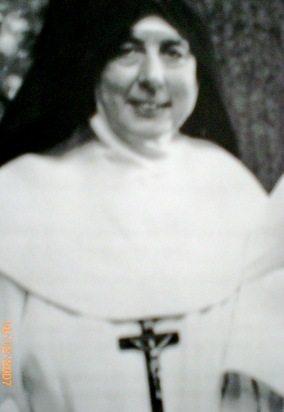 Today marks the 29th anniversary of death of Mother Marie des Douleurs, known in history as Suzanne Wrotnowska (1902-1983), the foundress of the Congregation of Benedictines of Jesus Crucified. A true spiritual mother of all who need mercy, especially women who would not be able to enter the monastic life due physical impediments. Mother Marie's spiritual maternity extended also to priests who haven't repented of their sin.
Today marks the 29th anniversary of death of Mother Marie des Douleurs, known in history as Suzanne Wrotnowska (1902-1983), the foundress of the Congregation of Benedictines of Jesus Crucified. A true spiritual mother of all who need mercy, especially women who would not be able to enter the monastic life due physical impediments. Mother Marie's spiritual maternity extended also to priests who haven't repented of their sin.In the eventide of my life, I have such a need of recollection, such a need to obey and to humble myself. I am unworthy of having been chosen to found the Congregation. I suffer being pulled between heaven and earth. The cross grows heavy. The Lord gave me as my portion the souls of guilty priests...my own soul disappears beneath an accumulation of iniquities! But I had asked for this humiliation! How is that the Lord was able to make use of so little a thing? His fidelity, His consuming love, this all my life, my light my death.
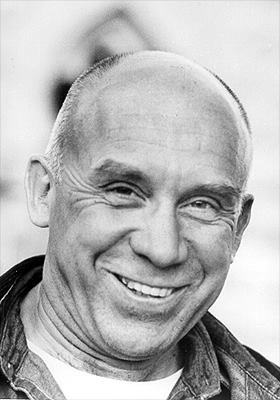
Hear with favor our prayers, which we humbly offer, O Lord, for the salvation of the soul of Father Louis (Thomas Merton), your servant and Priest, that he, who devoted a faithful ministry to your name, may rejoice in the perpetual company of your Saints.
The famous Trappist monk, Thomas Merton (b. 1915) died on this date in 1968.
In very many ways Merton was a consummate human being: loved pleasure and engaged his freedom only to transform pleasure and his version of freedom with his embrace a life of prayer and silence as a Strict Obsernace Cistercian (a Trappist monk) in a Kentucky abbey. In the monastery Thomas Merton was known as Father M. Louis, a name I still prefer to use because of his commitment to the monastic life. At the command of his abbot, Merton wrote of his conversion in his 1949 best seller, The Seven Storey Mountain, introducing millions of people to the monastic life. No other book since this one has had such a critical impact on Catholics.
His conversion story was only one of many books and essays published by Merton and even in death Merton continues to publish due to the finding of new materials or the repackaging of thought into new books. The irony of Merton's life as a monk is that he died in Asia conferencing with an international and interfaith group of monks and nuns. His body was brought home in a steel casket on a military transport.
 Vatican Radio launched an iPhone app on iTunes. The app is free. It lets you follow the Pope and the work of the Church throughout the world as well as providing you with other pertinent information and cultural engagement.
Vatican Radio launched an iPhone app on iTunes. The app is free. It lets you follow the Pope and the work of the Church throughout the world as well as providing you with other pertinent information and cultural engagement.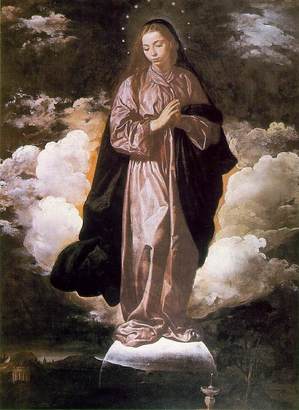
Lord our God, as we celebrate Mary, daughter of Zion and figure of the new Jerusalem that descends from heaven, we await the coming of your Son Jesus Christ in glory. Hasten the day of his coming, and all the nations, together with all of Israel, will find salvation in your eternal kingdom. We ask you this through the Holy Spirit, who consoles us and intercedes for us now and forever.
Today's feast of the Immaculate Conception of the Blessed Virgin Mary ought to be interpreted on the basis of sacred Scripture (Zeph 3:14-18a; Gal 4:4-7; Lk 1:39-55), sacred Tradition and the Magisterium. This feast is best understood from the point of view of the eschatological context of Advent which focuses our attention essentially on the coming of the Lord at the end of time. Consider what the prayer above notes. Christians, remember, live in the end times now.
Mary's conception (through her parents Anne and Joachim) celebrated in the liturgical season of Advent is a fitting time in which we long, really desire, the Lord's coming. Our waiting for the Messiah, now for the second time, is a true hope of all hopes.
The Church in the Eastern Roman Empire, known as Byzantium, has observed this feast with great interest before it reached the Western Empire by the 10th century. In the East today is also called the Conception of Saint Anne. If you recall, the Franciscan and Doctor of the Church Saint Bonaventure has a clear teaching on the Immaculate Conception of Mary, defended and promoted by other Franciscan theologians and made part of Catholic dogma in 1854. The precise Catholic theological teaching of the Immaculate Conception is not shared by some Protestant ecclesial communities and the Orthodox Churches. "For them, Mary's conception has the value of a sign: through the divine intervention that was needed to heal Anne of her infertility, all of humanity has been healed of its sterility, brought on by sin, and has become the womb capable of welcoming the Word's Incarnation. It is the Lord himself who, in his infinite mercy, prepares the way for his decisive intervention in history." In many ways there is not that much difference in substance but acknowledged nonetheless here. Under the title of the Immaculate Conception, Mary is the patroness of the United States of America.
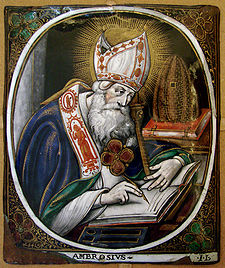
O God, who made the Bishop Saint Ambrose a teacher of the Catholic faith and a model of apostolic courage, raise up in your Church men after your own heart to govern her with courage and wisdom.
The prayers for todays Mass that honors the ecclesial memory of one of the famous saints are key to pinpointing what the Church most revers about the man who was concerned about right-thinking and right-praying Christians. Who was Ambrose? The Collects tells us that he was a bishop, saint teacher, model of courage seen in the apostles and capable of good governance, that is, he had courage and wisdom. What moved Ambrose? Again, the collects tell us he was constantly inspired by the light of faith.
The Church recalls Saint Ambrose of Milan (340?-397), bishop and Doctor of the Church. Ambrose was born in Trier to a Roman family: his father was praetorian prefect of Gaul and educated in Rome In about 372 he began his public service as prefect of Liguria and Emilia, whose capital was Milan.
Let's recall that the ecclesial tradition indicates that the gospel was brought to Milan by Saint Barnabas and that the city's first bishop was Saint Anathalon. In 374 the bishopric of Milan became vacant. An astute Ambrose tried to work with the conflict between orthodox Catholics and Arians over the appointment of a new bishop. His words were convincing and hopeful that the people demanded --not the pope-- that he become the bishop of Milan.
Ambrose's personal holiness was such that he gave his material belongs to the poor and to the Church. We attentive to the prayerful reading of the Scriptures and praying the Liturgy. He was a very attentive bishop as the Good Shepherd. Works of charity and clear teaching was attractive to many. As bishop he defended the rights of the Church and tried to correct the errors of the Arian heresy with learning, firmness and gentleness.
The Divine Office that we pray today is still peppered with Ambrose's hymns.
Saints beget saints. Ambrose
was central to the conversion of St Augustine to Catholicism.
Pope Benedict gave his own catechesis on this great saint today. Ambrose is the "Icon of Christ."
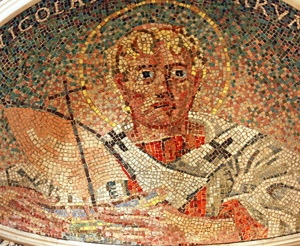
We humbly
implore your mercy, Lord: protect us in all dangers through the prayers of the
Bishop Saint Nicholas, that the way of salvation may lie open before us.
Today's saint restores the human dignity to his people and brings supernatural light to them, that is, he carries Jesus Christ to others.
Most people today have lost sight of who the real Nicholas is: he moves from being a bishop, one who offers the Divine Liturgy, wonder-worker, and a man of great charity in his teaching truth and helping the poor. We recognize in Saint Nicholas today not a man love and adherence to Christ but someone who represents insipidity. Nicholas is far from the commercial mindset. Hopefully we can target the reality and sweep away silliness.
Two Benedictines who blog give a little more insight into Saint Nicholas: Dom David and Dom Mark Daniel.
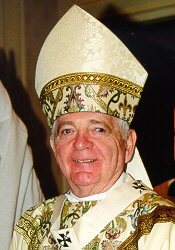
The Most Reverend Daniel A. Cronin, Archbishop Emeritus of Hartford, is coming to East Haven on Thursday, December 6, 2012 to preside and preach during an Advent Evening of Reflection, with a focus upon the "Year of Faith."
The presentation begins at 7:00 PM and takes place at Our Lady of Pompeii Church, 355 Foxon Road, in East Haven.
The reflection will be offered in the context of a Holy Hour, to also include prayers, readings from Scripture, and the Adoration of the Blessed Sacrament.
Join us for prayer and let friends know.
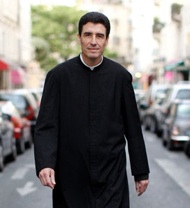
Can I say this? I want every priest to be like Michel-Marie Zanotti-Sorkine: a sign of unlimited availability to Christ and to humanity.
In Marina Corradi's Avvenire article "The Pope is Right: Everything Must Start Afresh from Christ," (thanks to Sandro Magister for bringing this article to our consideration) she portrays a French priest that is attractive and full of humanity.
Two paragraphs strike me as important for us to reflect upon:
- "...he affirms that a priest who has an empty church must examine himself and say: 'It is we who lack fire.' He explains: 'The priest is 'alter Christus,' he is called to reflect Christ in himself. This does not mean asking perfection of ourselves; but being conscious of our sins, of our misery, in order to be able to understand and pardon anyone who comes to the confessional.'"
- "In church, he welcomes everyone with joy: 'Even the prostitutes. I give them communion. What should I say? Become honest, before you enter here? Christ came for sinners, and I have the anxiety, in withholding a sacrament, that he could bring me to account for it one day. But do we still know the power of the sacraments? I have the misgiving that we have excessively bureaucratized the admission to baptism. I think of the baptism of my Jewish mother, which in terms of the request of my grandfather was merely a formal act: and yet, even from this baptism there came a priest.'"
His pastoral plan for those who ask the question about returning to the practice of the faith: "the Marian embrace, and impassioned apologetics, which touches the heart."
A man with Russian-Jewish-Corisican-Italian blood, a singer-song writer, author (his latest is Au diable la tiédeur, {To the devil with lukewarmness}), and now an ordained Catholic priest in the Archdiocese of Marseille.
Father Michel-Marie
Zanotti-Sorkine is pastor at Saint-Vincent-de-Paul in Marseille.
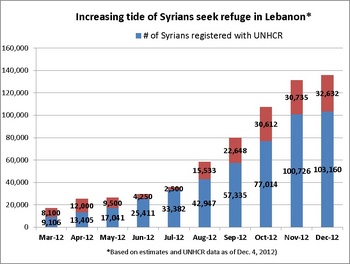
According to UNHCR data, Lebanon is currently hosting over 135,000 Syrians, not including many lucky enough to find work who haven't sought to be registered.
With AVSI, you can help by visiting this link.
Part of your Advent charitable giving, please consider making a donation to AVSI for this good work, others in the USA and internationally.
AVSI-USA is a non-profit of the international AVSI network, supporting human development in 38 countries, with special attention to each human person, according to Catholic social teaching.
The Mission of AVSI is "To support the AVSI network
by leveraging resources and contacts in the U.S. in order to enhance and
broaden the achievements of member organizations in promoting human dignity in
developing countries. The Association of Volunteers in International Service is
an international not-for-profit, non-governmental organization (NGO) founded in
Italy in 1972. AVSI's mission is to support human development in developing
countries with special attention to education and the promotion of the dignity
of every human person, according to Catholic social teaching. The AVSI-USA
office was established in 2001."
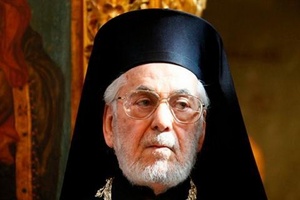 Greek Orthodox Patriarch Ignatius IV Hazim, 91, died
today, Wednesday, at a Beirut hospital after suffering a stroke a day earlier.
Greek Orthodox Patriarch Ignatius IV Hazim, 91, died
today, Wednesday, at a Beirut hospital after suffering a stroke a day earlier.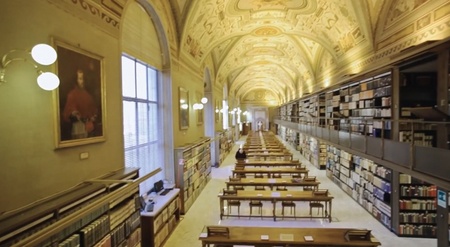 The manuscripts of the Vatican Library, 82K of them, are in the process of being digitized.
The manuscripts of the Vatican Library, 82K of them, are in the process of being digitized.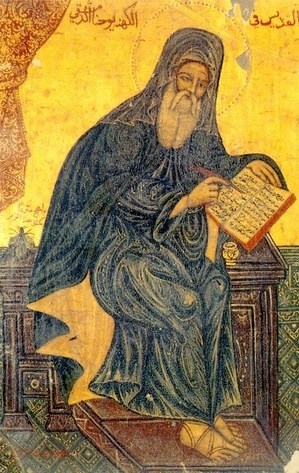 Grant, we pray, O Lord, that we may be helped by the
prayers of the Priest Saint John Damascene, so that the true faith, which he
excelled in teaching, may always be our light and our strength.
Grant, we pray, O Lord, that we may be helped by the
prayers of the Priest Saint John Damascene, so that the true faith, which he
excelled in teaching, may always be our light and our strength.
Hard to believe that 15 years have passed since John Paul's post synodal exhortation Ecclesia in America. It is a remarkable document in my opinion, even though it touches on many very serious problems that we need to face from Alaska to Argentina. We hear nothing of this document these days. Every so often we hear a reference to it when a hierarch wants to say something intelligent about the situation at hand in America. Perhaps we could go back to EA with fresh eyes. What is clear is to work on ways for greater communion and solidarity with the Christians across the boarders.
We need to continue to answer the thematic of the "Encounter with the living Jesus Christ: The way to conversion, communion and solidarity in America." We can't set tight with only what John Paul gave us to think on, and to work on. The strength of the Church in America rests not merely on our own solution to the matters at hand but also to our persistent call to holiness.
To honor the publication's anniversary events have been scheduled in Rome from 9-12 December. Among the presentations/dialogue we have:
- the event in Guadalupe as the origin of evangelization in the New World
- the post-Synodal Exhortation: prophecy, teaching and commitment
- the Apostolic Exhortation Ecclesia in America with the intercession of Our Lady of Guadalupe, star of the new evangelization and mother of the civilization of love
- the meaning of the Year of Faith
- Scenarios and proposals for communion and co-operation between Churches of the Americas and for solidarity among their peoples.
Happy to see that Carl Anderson, supreme knights of the Knights of Columbus was chosen as one the presenters for today's conference. He gives gravitas coupled with reasonableness. You may want to listen to Carl Anderson's interview with Vatican Radio it is here.
Mr Anderson's remarks:As a lay organization that has been in the United States, Canada, Mexico - and other parts of Latin America - for more than a century, we are particularly aligned with the vision presented in Ecclesia in America, and are working with the Church in our hemisphere on the project of the New Evangelization.
In re-reading Ecclesia in America 15 years after the close of the Synod for America held here in Rome in November and December 1997, three things stand out to me as particularly important to our discussion here and at the conference next week.
You heard yesterday that Pope Benedict XVI is now tweeting. Terrific!
The Papal Twitter account is up and running: @Pontifex
As of right now, the English page has 381K followers, the German has 9.5K, the Spanish 88K, the Italian has 36K, the French has 7k and the Arabic has 3,000.
The Press Office of the Holy See said the following about the Papal presence in the digital media.
The The Pope's presence on Twitter is a concrete expression of his conviction that the Church must be present in the digital arena. This initiative is best understood in the context of his reflections on the importance of the cultural space that has been brought into being by the new technologies. In his Message for World Communications Day 2009, which was published on the same day as the Vatican's Youtube channel was opened, Pope Benedict spoke of the necessity of evangelizing the 'digital continent' and he invited young believers, in particular, to introduce into the culture of this new environment of communications and information technology the values on which you have built your lives.
The Church must be reminded that it is not the master or the servant of the state, but rather the conscience of the state. It must be the guide and the critic of the state and never its tool. If the Church does not recapture it prophetic zeal it will become an irrelevant social club without morals or spiritual authority.
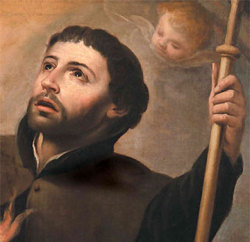 O God, who through the preaching of Saint Francis
Xavier won many peoples to yourself, grant that the hearts of the faithful may
burn with the same zeal for the faith and that Holy Church may everywhere
rejoice in an abundance of offspring.
O God, who through the preaching of Saint Francis
Xavier won many peoples to yourself, grant that the hearts of the faithful may
burn with the same zeal for the faith and that Holy Church may everywhere
rejoice in an abundance of offspring.
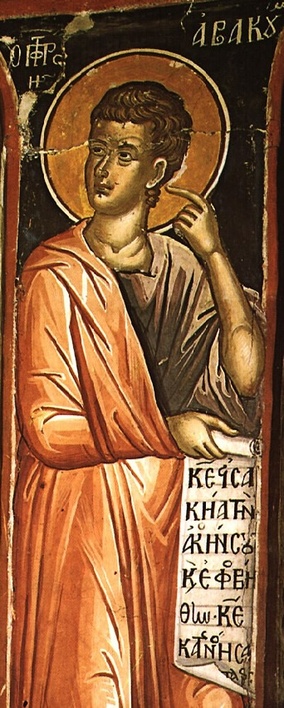 The Byzantine liturgical calendar includes the prophets in its commemorations because they foretell the coming of the Messiah, as the Kontakion states for today. (The Latin Church has the prophets in the Martyrology but does often feasts.) As a liturgical note, kontakion is a poetic text tied to the celebration at hand, or of a particular saint recalled during the Liturgy, most often sung by the deacon or some designated person following the proclamation of the gospel.
The Byzantine liturgical calendar includes the prophets in its commemorations because they foretell the coming of the Messiah, as the Kontakion states for today. (The Latin Church has the prophets in the Martyrology but does often feasts.) As a liturgical note, kontakion is a poetic text tied to the celebration at hand, or of a particular saint recalled during the Liturgy, most often sung by the deacon or some designated person following the proclamation of the gospel.At the Sunday Angelus today, the Holy Father notes some crucial points about our Christian faith that can't go unheard and need to be savored deeply in the heart. Notice, please, that Benedict doesn't talk about expectation but he does speak of the Lord's coming and presence; his death and resurrection and our final destiny (that is, love) and doesn't mention the Christ Child as the exclusive image of Advent. The Cross, resurrection and ascension is our only Hope. Pope Benedict addressed the faithful with the following:
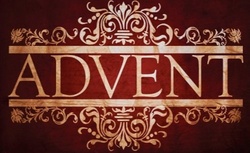
Today the Church begins a new liturgical year, a path that is further enriched by the Year of Faith, 50 years since the opening of the Second Vatican Council. The first Time of this journey is Advent, composed, in the Roman Rite, of the four weeks that precede the Birth of the Lord, that is, the mystery of the Incarnation. The word "Advent" means "coming" or "presence." In the ancient world, it signified the coming of the king or the emperor into one of the provinces; in the language of Christians, it referred to the coming of God, to His presence in the world; a mystery that involves the whole of the cosmos and of history, but that recognises two culminating moments: the first and the second coming of Jesus Christ. The first is the Incarnation itself; the second is the glorious return at the end of time. These two moments, chronologically distant - and it is not given to us to know how far apart they are - touch us deeply, because by His death and resurrection Jesus has already accomplished that transformation of humanity and of the cosmos that is the final goal of creation. But before that end, it is necessary that the Gospel be proclaimed to all nations, as Jesus says in the Gospel of Saint Mark. The coming of Christ is continuous; the world must be infused by His presence. This permanent coming of the Lord in the proclamation of the Gospel requires our continual collaboration; and the Church, which is like the Betrothed, the promised Bride of the crucified and risen Lamb of God (cfr. Rev. 21,9), in communion with her Lord collaborates in this coming of the Lord, in which His glorious return is already begun.
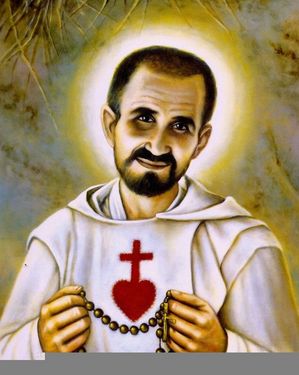 God our Father, you called Blessed Charles to live through your love in intimacy with your Son, Jesus of Nazareth. Grant that we may find in the Gospel the foundation of a more and more luminous Christian life and in the Eucharist, the source of universal kinship.
God our Father, you called Blessed Charles to live through your love in intimacy with your Son, Jesus of Nazareth. Grant that we may find in the Gospel the foundation of a more and more luminous Christian life and in the Eucharist, the source of universal kinship.